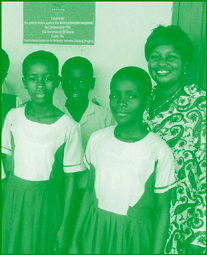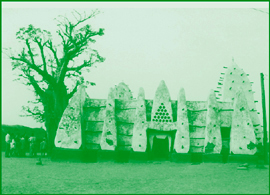
The secret to Ghana’s peace and friendliness lies in the moral values of its people. These values derive from the importance they set on social harmony and the well-being of others, not just of the individual. This is manifested in the Ghanaian virtues of hospitality, kindness, compassion, generosity, faithfulness, and truthfulness, and their quest for peace, justice, dignity, and self-respect. On the flip side, however, especially where money is concerned, Ghanaians will readily complain of their own negative traits of materialism, jealousy, and corruption.
Attitudes of social conformity and tribal loyalty, which are firmly rooted in ancient tradition and religion, make for a tight-knit and respectful society with clear boundaries and rules, but Ghanaians also realize that such unchanging traditions can at times stand in the way of the open-mindedness required to accept and benefit from progressive, modern ideas.
Many Ghanaian values and attitudes can be summed up in proverbs from the local languages, and relevant examples are quoted here. Ghanaians use proverbs widely to impart wisdom, and being skilled in the use of proverbs is a revered quality. Traditionally, Ghana has an oral culture in which stories, proverbs, and knowledge have been passed down from generation to generation.
Ghanaians recognize the dignity of their fellow human beings and have a deep and abiding concern for human welfare and happiness. Human relationships are considered the most valuable of possessions.
The human being is more beautiful than gold.
Mutual help, collective responsibility, and reciprocal obligations are regarded as important. Observers of Ghanaian life constantly remark on their strong sense of community. Everybody in a community or extended family will know, and show an interest in, the affairs of everybody else. The idea that you could live next to a neighbor for years without knowing his name, as can happen in the West, is completely alien to Ghanaians. From birth, a Ghanaian is a social being who does not, and will not, live in isolation from other people. An unfortunate outcome of this communality is that it is a great breeding ground for gossip, and the “bush telegraph” will soon let the whole town know of any misdemeanors or scandals! Many proverbs teach Ghanaians that “No man is an island.”
If two people carry a log, it does not press hard on their heads.
A person is not a palm tree that he should be self-sufficient.
You cannot tie a knot without using your thumb.
In practice, this means that there are many ways in which people work together and help each other. A babysitter is never needed; people work together on communal labor or farming projects; wealth is shared; the elderly are never lonely or isolated; and a man will forsake half his evening meal and his wife’s place in his bed should he receive an unexpected guest. The proverbial Ghanaian hospitality derives from these communal values. This is not to say, however, that this hospitality should be taken for granted; it does not allow for “freeloaders” who do not pull their weight.
Treat your guest as a guest for two days, and on the third day give him a hoe.
These communal and reciprocal values are extended to the whole of humanity, not just members of a single community. Foreign visitors will therefore find Ghanaians showing an interest in their well-being and day-to-day lives, and will receive numerous invitations to meals, parties, or hometowns. Some tourists go so far as to say they find this intrusive, but this is certainly not how it is meant. To live up to the reciprocal nature of the society, visits, invitations, and gifts given in appreciation of someone’s help are cherished as tokens of friendship and symbols of peace.
One outstanding feature of Ghanaian society is the emphasis on the importance of the family. It is not wrong to say that marrying and bearing children are more than expectations; rather they are requirements or obligations to society. Parents put a lot of pressure on their children to marry when they are of age, and do much themselves to find a suitable bride or groom for their ward. A marriage is the joining of two lineage groups, not just two individuals, and the two families are deeply involved in the whole process of finding a husband or wife, the marriage ceremony, and married life itself. It is unheard of for two individuals to elope or just walk into a registry office and marry. A girl’s parents look for a responsible man with the means to look after their daughter and grandchildren. For a man, the search is always on for a woman who is of good character, obedient, hardworking, and well-respected in the community.

The woman must also be able to fulfill what is seen as her primary responsibility, the bearing of children. Inability to do this is sufficient grounds for divorce or the taking of a second wife. Modern medical tests are changing the traditional view that infertility is never attributed to the man. Childless couples are considered selfish and abnormal, or by some as victims of witchcraft, and do not gain respect or even sometimes a proper funeral.
Nothing is as painful as when one dies without leaving a child behind.
There is no wealth where there are no children.
As a result, large families are common, although not as large as in the past. Foreigners past their teens will often be asked straight away, “How many children do you have?” rather than “Do you have any children?”
Parents cherish their children and bring them up to be virtuous, respectful, and responsible. A brief glimpse into a Ghanaian home can give the impression that children do not speak unless spoken to, are sometimes not even allowed to look an elder in the eye, and are always either busy with their household chores or getting caned. This does not show the whole truth, which is that Ghanaians love their children dearly and invest much time in them.
Absence does not bring up a child.
Children are extremely respectful and obliging to their parents (and all elders). The unfortunate stereotype we have nowadays of antisocial British children, abusing and disobeying their parents and teachers, is unknown in Ghana. It is common for Ghanaian families living in the West to send children of a certain age “back to the village” to prevent them from becoming corrupted by lax Western values. Anybody in a Ghanaian community who witnesses a child misbehaving will have no hesitation in admonishing them, before dragging them back to their parents for more of the same. Children are taught to do only what is within their capabilities, and not to try to attempt something that only an adult should do.

A child can crush a snail, but he can’t crush a tortoise.
A child’s family is much more than his or her parents and siblings. As part of a huge extended family, a child has the opportunity to learn from, and be cared for by, dozens of near relatives. It is not uncommon for a child to live with an uncle, aunt, or grandparent rather than his or her parents. Very often an elder girl will be “given” to a relative with small children so she can help care for them.
Members of the extended family, although not living in the same house or even necessarily the same region, see it as important to meet regularly. Visits are common, as are meetings at funerals, weddings, and other celebrations.
Ghanaian society is intensely religious. Traditional African religion, or animism, long predates the arrival of monotheism. Even Ghanaians who are Christians or Muslims may retain certain animist beliefs.
Animist beliefs posit the existence of a supreme Creator God, who has intermediaries in his dealings with humans, such as spiritual beings or smaller deities who inhabit natural objects. God is considered to be everywhere.
If you want to say something to God, say it to the wind.
A big reason why Ghanaians adhere to their moral codes is that God will know if you don’t. Things that happen in a person’s life are given spiritual causes, and God will treat everyone according to the good or bad they have done in their lives. This proverb implies that nobody can hide their sins from the eyes of God.
Because God does not like evil,
he gave each person a name.
Traditional African religion is built into the culture of the people and is responsible for many of their beliefs and traditions. The Ghanaian cannot be separated from religion, and religion cannot be separated from the Ghanaian. God is constantly referred to in conversation, proverbs, greetings, children’s names, and explanations of natural events.

Thus, when the later, revealed religions of Islam and Christianity were introduced by Muslims from the north and Christian missionaries from the coast, a very receptive audience with similar beliefs was waiting. These two religions are now firmly implanted in Ghana, mainly retaining this north–south divide. Around two-thirds of Ghanaians are Christians, 15 percent are Muslims, and the rest retain their animist beliefs. Mosques and churches abound throughout the country, many with schools attached.
Churches attest to their European roots, Methodism, Presbyterianism, and Roman Catholicism being major denominations. Pentecostal or “spiritual healing” churches have proliferated, as these offer an animated type of praise and worship more attuned to the traditional form. A Ghanaian will invariably ask you, “Which church do you go to?” rather than “Do you go to church?” Atheism and agnosticism are virtually unknown in Ghana (and are mainly confined to those who have lived overseas) and, for anybody wanting truly to assimilate into Ghanaian life, being a follower of religion is a must. If you are making friends in Ghana, these friends will sooner or later invite you to their church. Be prepared for long services, often only in the local language. For language learners, try to find one of the many churches that have one pastor preaching in English, with another repeating in the local language. Aside from the usual Sunday morning service, there are Bible study groups, prayer meetings, parades, and even all-night services (known to be a well-used cover for unfaithful partners!).

The decline and fall of a nation begins in its homes.
Tradition, religion, and strong familial and communal bonds all work together to give a Ghanaian clear moral guidelines, and the development of a good character is considered vital. Moral values are instilled in a Ghanaian from birth, and can be divided into those values affecting other people, and those values pertaining to oneself.
The ethic of responsibility for others is always put above an individual’s rights.
If you trample on somebody else’s things while looking for your own, you will never find them.
Moral values are not necessarily founded on religion, but on the quest for a harmonious social life. Traits and actions detrimental to society are considered evil in the eyes of both God and the people. These may include backbiting, egoism, selfishness, solitariness, laziness, lying, stealing, adultery, rape, incest, murder, and suicide. When Ghanaians do something good for another person or for society, they do it because they rightly believe that, directly or indirectly, they are also doing good for themselves. Sharing is expected.
If one person eats all the honey, he is sure to get a stomach ache.
Similarly, actions against another person or society are likely to have detrimental personal repercussions.
If you don’t allow your neighbor to count to nine, you will not be able to count to ten.
A Ghanaian is expected to show respect to others, especially elders. This can be seen in the way people greet others. Insulting another person, especially using words like “stupid” or “animal,” is immoral, as is not giving gifts or help where they are due. Positive character traits inculcated in Ghanaians include probity, patience, fairness, humility, gratitude, temperance, perseverance, trustworthiness, chastity before marriage, and faithfulness in marriage.
Money is expected to be used wisely and shared among the extended family. Selfishness or wasting money on hedonistic pursuits is one of the easiest ways to lose respect.
Money is like a servant; if you abuse it, it runs away.
Ghanaians are also very ambitious and, for the most part, hardworking.
The person who goes to fetch water does not drink mud.
Any opportunity for advancement in the form of education, employment, or travel is eagerly seized. People will strive for power and influence.
If power is for sale, sell your mother to get it.
Once you have it, you have the means to buy her back.
In times of hardship, the Ghanaian values of spirituality, family support, sense of humor, and optimism can always be relied on to help retain a positive outlook on life.
Foreigners working with Ghanaians sometimes do not immediately perceive the work ethic of ambition and diligence, mainly because there is a very lax attitude toward timekeeping. Gender attitudes are also different from ours, and expats can expect to witness what they may consider very antiquated attitudes toward women in both the workplace and the home.
Westerners are generally viewed as having lower moral standards than Ghanaians. Social breakdown, warmongering, sexual depravity, marginalization of the older generation, and disrespectful standards of dressing and behavior all contribute to this view. Although foreigners will be afforded some leniency (an American in a miniskirt will attract fewer comments than a Ghanaian in a miniskirt), it is best to be aware of what constitutes acceptable behavior. Remember that you have been given the privilege of visiting someone else’s country, and should respect that privilege. When in Rome.…
Older people are accorded massive respect in Ghana. It is believed that they have reached old age through living in harmony both with the ancestral spirits and with natural forces. They are regarded as the embodiment of experience, wisdom, and traditional lore, and their company and counsel is regularly sought by relatives. For their part, children and grandchildren see it as their unquestioned responsibility to look after their aged parents and grandparents.
Just as someone has looked after you when you were growing your teeth, so should you look after them when they are losing theirs.
Watch how Ghanaian children address and behave toward their elders and this deep veneration is plain to see. Children make sure they greet elders correctly and may prefix every single sentence to an elder with the local equivalent of “Please.” Ask a child a question requiring only the answer “Yes” and they will habitually answer with “Yes, please.” It is not done for children to ask elders how they are, only to respond to the elders’ questions. The younger generation should make a token effort of bowing, curtsying, or saluting when greeting elders, or of rising when an elder greets them and they are sitting down. In Akan, elders are often addressed as “Nana,” which can mean grandparent or chief.
Even an elder sibling or friend is accorded the same respect. Firstborn children occupy a very special place in the family and much is expected of them, especially as regards looking after the younger children. The powerful influence of the elders is always felt.
When an elder is in bed, his feet are still outside the room.
When you get wealthy, the people say, “You wicked person,” and when you have nothing they say, “You unlucky person.”
Money talks in Ghana, and, unfortunately, traditional values can fly out of the window when cash is up for grabs. Attitudes toward a person are heavily influenced by how much money they have. Women will take gentlemen friends solely for their wallets. Somebody who is successful in business will encounter a lot of jealousy. Some people will attempt to emulate the same business, while others will actively seek to bring the successful businessperson down. People with little money will envy those who have more. (A Ghanaian who tells you he is “hot” is not complaining about the weather—it means he has no money.) Someone who is known to have money can be a target for unscrupulous thieves and armed robbers. Despite their seemingly happy and peaceful coexistence, almost everyone you meet will maintain that only sufficient money would bring them true happiness, and many are prepared to go to any lengths to get it.
Rich people in high positions may often consider themselves “untouchable” and abuse their power. In this regard, they would do well to heed the traditional Ghanaian proverb.
Instead of doing the wrong thing, then pacifying people with money, do the right thing and save your money to look after your children.
There is often an element of the “pull-him-down” attitude when a Ghanaian is being successful (sometimes referred to as an African “PhD”!). This attitude, and the Ghanaians’ idealistic view of European advancement and cooperation, has given rise to the following story as one explanation for African poverty.
A Self-Deprecating Tale
Two black men and two white men were being chased by a lion in the forest, and the only way to escape was to climb a tree. The black men started running, but one saw that his companion was getting ahead of him. Not wanting to be outdone, he knocked his friend down and reached the tree by himself. Unable to reach the lowest branch to climb up, he was eaten by the lion. The white men, however, ran to the tree together and were able to help each other to climb up, and were both saved.
Looking good is very important in Ghanaian society. A morally upstanding Ghanaian is expected to dress well and make sure his or her family does so too. If a husband or children are seen dressed shabbily outside, then this reflects badly on the wife and mother. Especially for people of status, a smart appearance is considered a vital attribute.
Apart from the mad naked men sometimes seen walking about shouting to themselves, Ghanaians dress extremely smartly, especially for work, parties, and church, and much care is taken over personal hygiene and the washing and ironing of clothes. Women spend much time and money on their hair. Visitors should follow this example, as dressing inappropriately is a certain way to lose respect. Ghanaian women refer to a man as “handsome” because of the way he dresses, not his physical appearance. If you turn up to teach your first class in flip-flops, shorts, and crumpled T-shirt, maybe nothing will be said to you because you’re from a different country, but you can bet they’ll be muttering about you in the staff room.
All types of clothes are available in Ghana, including the cheap charity imports known as Obroni wawu (dead white man’s clothes!). Buy some colorful local cloth and get yourself measured up for a smart church outfit. Wear black or red and black for funerals, and white for happier celebrations. Although it’s seen all over the cities these days, with a style of provocative dressing known as Apuskeleke becoming increasingly popular, it is still considered unacceptable for women to show too much leg or bosom. If you are swimming, take a wraparound to cover yourself when you get out. Some elders do not approve of females wearing trousers; long dresses are better. For men, the unshaven look is not fashionable. Don’t wear shorts when working or traveling. Remember that your appearance will directly influence the impression Ghanaians form of you. You may be a professor, diplomat, film star, or millionaire, but wear a T-shirt and ripped jeans to church, and you’re nobody.
Good feathers are what make a bird beautiful.
Although Ghanaians have a strong sense of national unity, it is the tribe, or linguistic group, with which they feel most closely associated and which can dominate personal relations. One of the first questions asked on an initial meeting is “Which tribe are you?” and tribal links give rise to favoritism. Job offers, friendships, and political appointments can all be subject to tribal affiliations. President Kufuor, an Ashanti, made a strong unifying statement by appointing a Muslim from the north, as his vice president. Ghana’s many French-speaking immigrants, especially from the poorer countries of Togo, Mali, and Niger, tend to be viewed as second-class citizens. People who live in a town, but are not of that town’s tribe, often live together in a suburb known as “Zongo.” Tribalism very rarely manifests itself as anything other than nepotism, except around Bawku in the Upper East Region, where clashes between the Mamprusi and Kusasi tribes continue to claim lives.